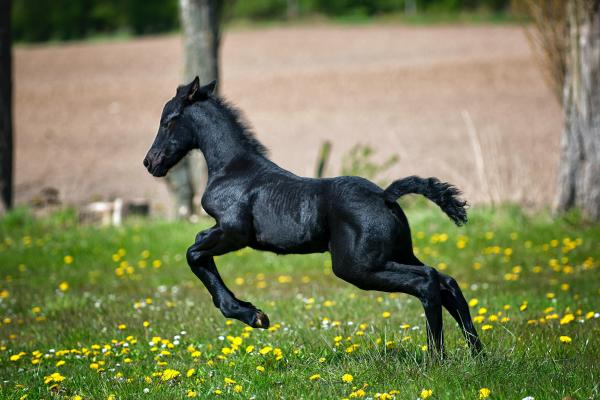How Long Does a Horse Live?



See files for Horses
The earliest accounts of the breeding and domestication of horses date from around 3500 B.C. Horses played a fundamental role in the development of civilization as we know it. These animals made it possible to travel enormous distances and connect different peoples. However, in the 20th century, the relationship between humans and horses has changed fundamentally. Nowadays, the former military and farm animals are used for recreational activities and sporting competitions. But do you know how long horses live?
The following AnimalWised article explains how long a horse lives and what are the main factors that influence their longevity.
How many years does a horse live?
The life expectancy of domestic horses has increased over time. In the past, the average life expectancy of these animals was about 20 years, while today horses can live 30–35 years. This increase in life expectancy is due to advances in veterinary medicine, the development of animal nutrition and, in general, the improvement of care and living conditions of these animals.
However, we must keep in mind that the average life expectancy of a horse depends on a variety of factors, such as its size, breed, or lifestyle. In the following section, the most important factors that determine the life expectancy of a horse will be explained in more detail.
How long does a wild horse live?
There is a marked difference between the lifespan of domestic horses and wild horses. The longest living wild horse was 36 years old, while the oldest domestic horse was 62 years old.
The life expectancy of wild horses also depends on a variety of factors, such as the availability of food, the weather, the development of diseases, and so on. In general, however, they live less than domestic horses, about 20-25 years. However, the lifespan of wild horses is very range.
Continue reading in this other article where we talk about what wild horses are and the different subspecies of horses that exist in the world.

What does the average life of a horse depend on?
As we have seen, the average life expectancy of horses is about 30 years. However, there are several factors that can affect the average life expectancy of these animals, such as:
- Genetics: there is only one kind of horse (Equus caballus), but there are many breeds and types of horses. Additionally, different horse breeds may have slightly different lifespans. Pony horses develop later and therefore have a longer life expectancy than larger horses. At the age of 28, a Shetland pony may have ten years to live, while a warm-blooded horse at the same age is already considered an old animal. In addition, warm-blooded horses (such as the Arabian or the English Thoroughbred) are more long-lived than cold-blooded horses (such as the Percheron).
- Lifestyle: another point to consider in the life expectancy of horses is the activity they develop during their life. In general, horses that do heavier or more intense work (such as draft horses, racehorses, etc.) have a shorter life expectancy than domestic horses. Causes of death also vary between different types of horses. While musculoskeletal disorders are the leading cause of death in sport horses, digestive diseases are the leading cause of death in domestic horses.
- Care: it is logical that horses that enjoy better care generally live longer than those with poor living conditions. Advances in veterinary care, adapted feed, and improvements in animal welfare are some of the factors that have helped increase equine longevity in recent years. Factors such as a balanced, age-appropriate diet protect them from disease and give them sound health. Daily exercise without excessive exertion also keeps them fit.
How to make a horse's life longer?
At about age 20, horses begin to be considered geriatric animals. However, with good care, these animals can extend their lives to 30-35 years.
Here are the most important factors that can help horses live longer and better:
Feeding
A well-balanced, high-quality diet helps improve animal health and reduces the risk of many nutrition-related diseases.
For stabled horses, it is recommended to divide the daily ration into several feedings per day (at least 2-3 feedings). In general, the ration should consist of a grain feed and high quality forage (preferably hay).
The daily ration should be 1.5-2% of the animal's weight, divided into forage and feed. The percentage of each of these elements depends on the status of the animal and its activity level, and may reach a 50/50 ratio in high performance horses or pregnant mares. For animals kept on pasture, administer supplemental feeds as needed to meet the animals' nutritional requirements.
In addition to feed, water supply is also an essential factor. Horses must have constant access to a drinking trough with clean water that is preferably at room temperature (not too cold or too hot).
Environmental conditions
Maintaining optimal environmental conditions also determines the health status of the animals and thus their life expectancy. In the case of horse stables, stalls must be large enough for animals to turn around and lie down completely, and they must allow horses to maintain visual contact with each other. Inside the stalls, horses must have adequate bedding (straw, wood shavings or rice bran), which must be kept clean and dry at all times.
Humidity and temperature are also important, both for horses in the pasture and in the stalls. Although these animals can tolerate large fluctuations in humidity and temperature, the environment should ideally have a humidity of 60% and a temperature between 15-18ºC. Ventilation is also critical, as it allows the elimination of gasses from feces (ammonia) and dust from feed and bedding. Finally, horses that live outdoors must have a stable that protects them from the cold, heat, rain, etc.
Physical activity
Both a lack and an excess of physical activity can be detrimental to the health of horses, so it is essential to find an appropriate balance. Horses in the barn need to be outside daily and exercised regularly to stay active, strong, and healthy. For high performance horses, even if they are on a demanding training program, rest, and recovery periods must always be provided.
Preventive medicine
In the context of maintaining a high health status of these animals, vaccinations and deworming schedules are essential. In addition, proper grooming such as brushing, showering, cleaning the eyes and ears, shoeing, filing the teeth, etc. also plays a key role in their well-being.
Hoof care is also important. Hoof problems can keep a horse from exercising. Trim a horse's hooves every one to two months. Depending on your horse's conformation and activity level, consider putting horseshoes on him to keep his hooves in good condition.
Veterinary assistance
It is logical that access to quality veterinary services in situations where animal health or welfare is compromised is also a critical factor in improving equine longevity.
You may also be interested in the following article, in which we explain why horses neigh.

If you want to read similar articles to How Long Does a Horse Live?, we recommend you visit our Basic care category.
- Wallin, L.; Strandberg, E.; Philipsson, J.; Dalin, G. (2000). Estimates of longevity and causes of culling and death in Swedish warmblood and coldblood horses. Livestock production science, 63(3), 275-289.







